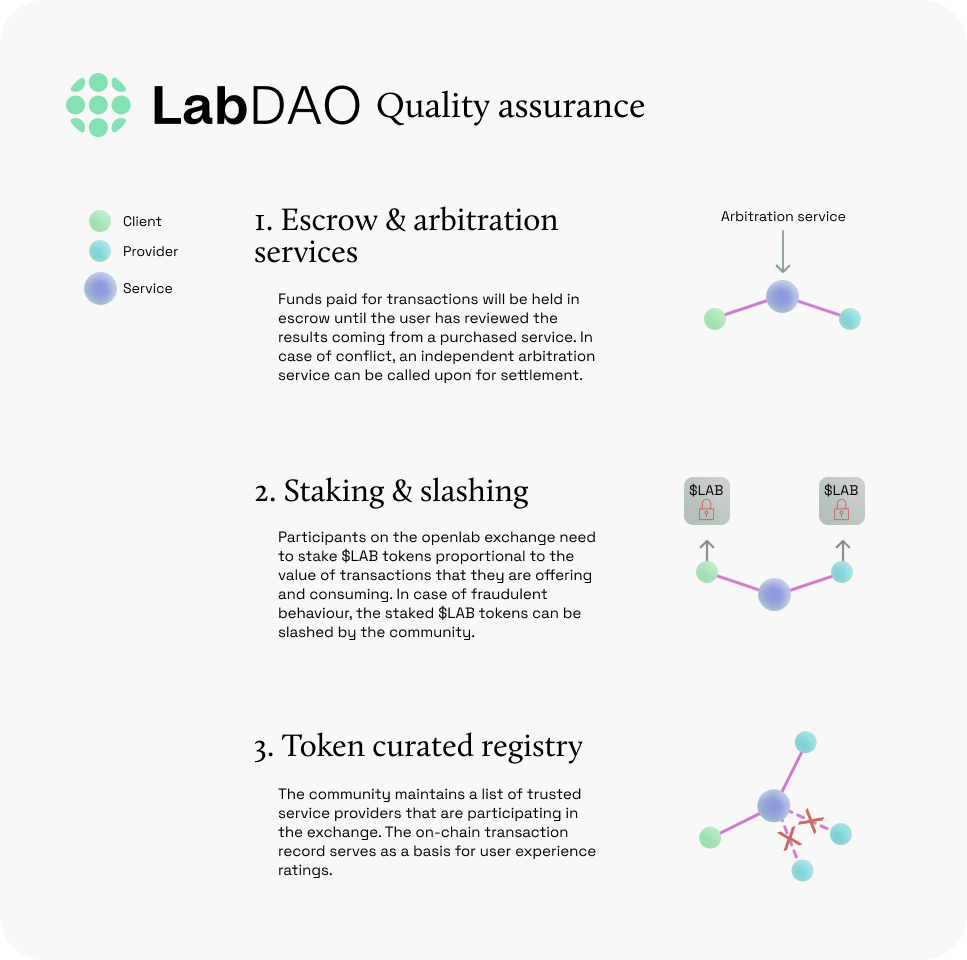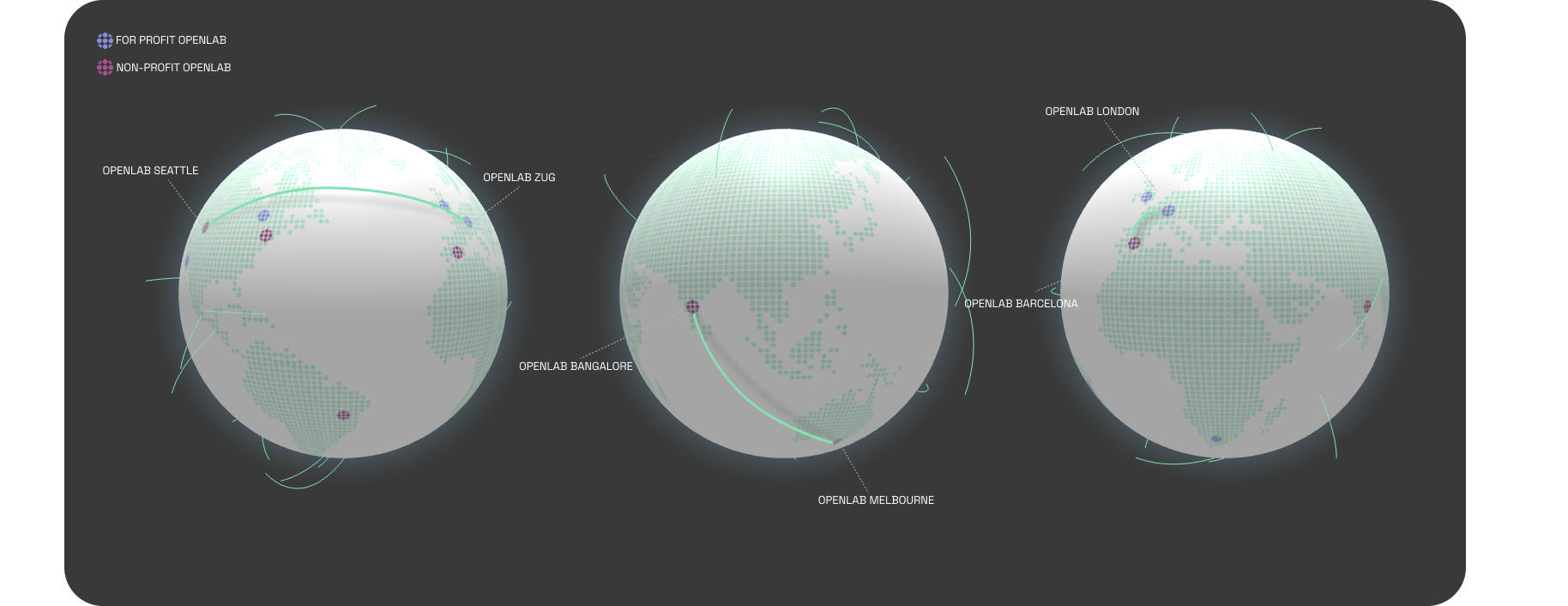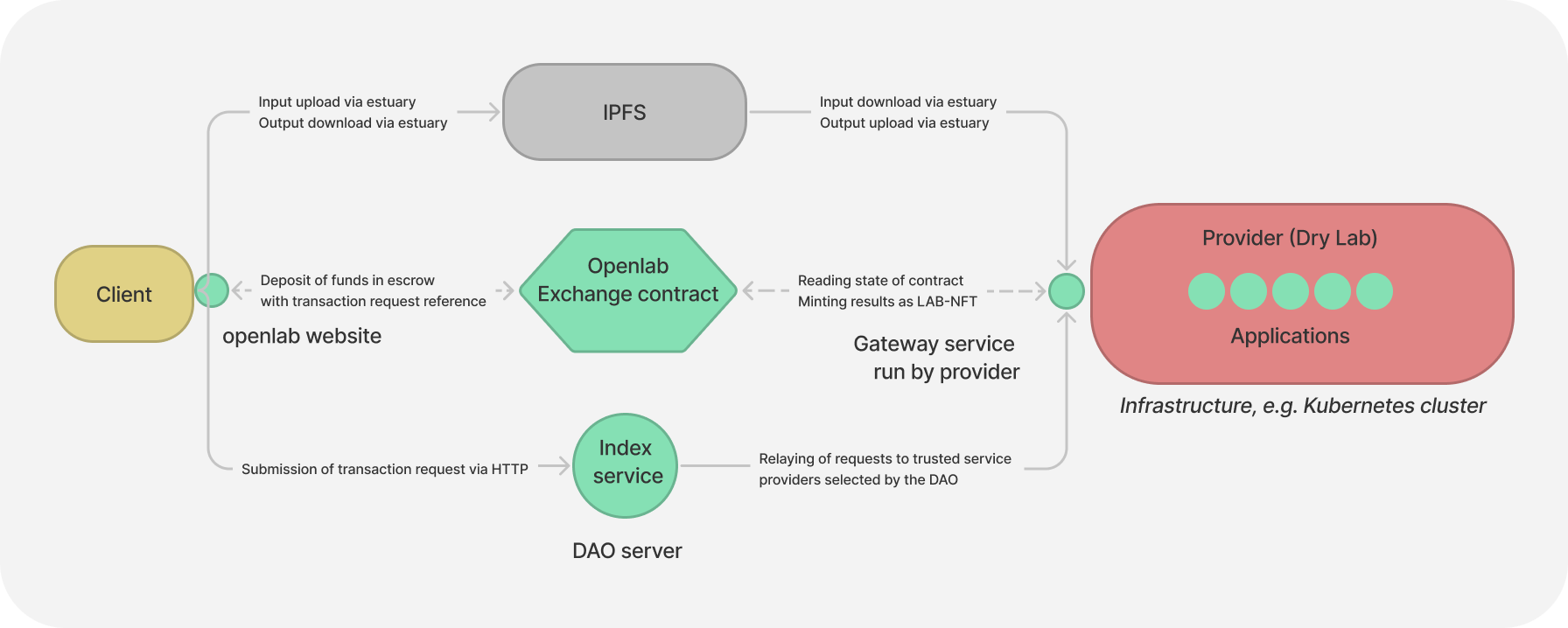
# LabDAO one-pager
This is a short memo summarizing LabDAO, an ImpactDAO. To learn more head to our extended [memo](memo.labdao.com), read the [docs](docs.labdao.com) and join our [discord](https://discord.gg/labdao).
## Problem
Running code has a low cost and a high reproducibility. In contrast, life science laboratory services have a high cost and a low reproducibility. To accelerate human progress, can we abstract laboratory services into code?
Running a laboratory or scientific compute infrastructure is expensive, but the marginal cost of running one experiment is cheap. In principle a laboratory could run additional experiments as a service for members of its community, but there are no open standards for communicating instructions or transferring compensations.
Centralized cloud labs have tried to abstract laboratory services into code in the past, but haven’t been successful. This is because of the high capital expenditure to build and run a lab, and the low probability of meeting all customer needs with a monolithic infrastructure.
Life science software-as-a-service companies offer hosted services, such as sequencing data analysis, to customers. These companies have been benefitting greatly from the open source communities that have developed most of the software tools they are offering. Given their centralized nature, these SaaS companies are publicizing their software development needs while privatizing the income generated by hosting these tools. The developers of useful open source software are not rewarded for their inventions by the providers of their tools.
## Solution
LabDAO is a global online community of scientists and engineers that come together to develop and share open tools for life science research. Similar to how open source has accelerated progress in information technology, we believe open computational and wet-lab tools will accelerates progress in the life sciences.
To provide the infrastructure for the LabDAO community to sustainably grow and innovate, we are building openlab, an exchange protocol for buyers and sellers of off-chain tools and laboratory services. The LabDAO community curates, maintains and standardizes these tools and protocols. With access to open tools, everyone can become an independent entrepreneur and scientist.
The exchange protocol will launch as a decentralized API-as-a-service provider. Every owner of compute hardware can deploy their own or LabDAO-maintained production-grade applications and expose them through the openlab exchange protocol to cover their costs. The future of bioinformatics is a network of compute clusters run by universities, for-profits and private individuals (e.g. former Ethereum GPU miners) offering standardized applications and a shared on-chain, open source payment interface.
Decentralized cloud labs solve issues faced by centralized cloud labs by distributing the requirements for a complete transaction across laboratories. This lowers the upfront capital expenditure, enables specialization and incentivizes fast adoption of new services to meet customer demand. After focusing on computational biology, we plan to grow the openlab exchange into the wet lab space. Users will book standardized laboratory services from biofoundries, core facilities and CROs using the same interface. Initial applications will include DNA assembly, synthesis and sequencing.
Every marketplace rests on a public good that requires maintanance. In case of openlab, the LabDAO community is channeling revenue generated on the exchange into supporting the development of open source tools, managing the quality of laboratory services and growing the ecosystem.
Within the DAO teams will form to launch companies specialized in the provision of particular computational or laboratory services. The DAO will support the formation of these entities with direct access to the exchange network, maintanance of standards and financial support from the DAO treasury.
LabDAO will give rise to a global network of companies all integrated within the same exchange and standards.

## Technology
The openlab exchange is being deployed on GnosisChain to enable low gas fees. Initial applications offered by the community include standardized bioinformatics services, including [nf-core](https://nf-co.re/). Upcoming applications include language models, in-silico docking, protein folding, and first wet-lab services such as molecular cloning. The community is maintaining open source applications as gold standard.
Next to maintaining standards for individual services, the DAO also maintains a curated list of service provider wallets and their API gateways that have been validated by the community. While this might be less relevant for low-cost services, it is very important that wet lab processes are conducted in accordance to community standards by trusted providers.
Next to setting standards, the DAO and its partnering arbitration services, also settle conflicts among exchange participants. Payments are held in escrow until the transaction is completed and service providers stake LAB tokens that can be slashed in case transactions are found to be fraudulent.

## Team
### Launch Team (chronological order)
* [Niklas Rindtorff](https://twitter.com/Niklas_TR) - Physician, computational biologist, VitaDAO, ex Broad Institute & HMS
* [Rik Smith Unna](https://twitter.com/blahah404) - Computational biologist, ex Mozilla Science & University of Cambridge
* [Aakaash Meduri](https://twitter.com/AakaashMeduri) - Web3 developer, data scientist, chess master, ex Abbvie
* [Lily Hansen-Gillis](https://twitter.com/LilyHG_3) - UX Researcher, Surge Women
### Additional LabDAO contributors (alphabetical order)
* [0xkydo](https://twitter.com/0xkydo) - Tokenomics at Llama, ex traderjoexyz
* [Stanley Bishop](https://twitter.com/Science_stanley) - Head of data science at Drift Bio, DeepChem contributor
* [Theodor Beutel](https://twitter.com/theobtl) - Governance working group at VitaDAO, original "the DAO" OG
* [Boris Dyakov](https://twitter.com/BJ_Dyakov) - Graduate Student at University of Toronto, breathes DeSci
* [Jesse Evers](https://twitter.com/_jlevers) - Software engineer, college dropout, in love with APIs and motorcycles
* [Arye Lipman](https://twitter.com/aryelipman) - LabDAO genesis co-conspirator, MarsBio VC
* [Jocelynn Pearl](https://twitter.com/JocelynnPearl) - LabDAO genesis co-conspirator, Biotechnologist, founder of UltraRareBio
* [Jessica Sacher](https://twitter.com/JessicaSacher) - Founder of PhageDirectory, Microbiologist
* Tohrnii - Web3 developer, ex Lido Finance
* [Vincent Weisser](https://twitter.com/vincentweisser) - Tokenomics at VitaDAO, ex DexBlue and DegenScore
* [Todd White](https://twitter.com/DToddWhite) - Operations and legal at VitaDAO
* [Hossam Zaki](https://twitter.com/hossamzki) - Student at Brown University, ex Dept. of Biomedical Informatics at HMS
* [Jan Zheng](https://twitter.com/yawnxyz) - Co-Founder of PhageDirectory, Software engineer
## Financials
### Tokenomics Draft
A supply of 100M LAB tokens representing governance rights in the DAO are is planned. The ERC20 token supply is not capped and will likely have a low inflation rate to maintain community [engagement](https://m.mirror.xyz/Eb308XiSttfLIWWMq5tVZd6xswtUbVjEGngEBHezAEE) in the long term.
The initial supply of LAB tokens will be allocated as such:
* 10% of tokens reserved for the launch team
* 10% of tokens reserved for community auction, users, and early backers
* 30% of tokens reserved for DAO treasury (20% unminted)
* 50% of tokens reserved for rewards to market participants (providers and users of services)
### Launch Team funding needs
To accelerate the project development, the team is seeking funding from early backers of min. 500k USDC. The funding will go towards:
* launch team support and growth - 350k
* contributor grants - 100k
* variable costs such as cloud compute - 50k
The DAO launch team has set up a swiss non-profit association, openlab zug.
### Token lock and vesting
Launch team members and external funders will receive non-transferrable vLAB tokens based on their early contributions. LAB tokens will be vested on a linear monthly schedule over a lockup period of 4 years after the public launch. Launch team members will be subject to a 12 month cliff starting from the timepoint of them joining the project.
## FAQ
### Will you build labspace yourself?
In the future we plan to support the exchange with a global network of physical laboratories specialized in the execution of openlab requests. However, we see the primary role of the DAO to be a network of biotechnologists that go on and build their own, highly integrated, companies.

### What is the timeline?
* April '22 - launch swiss openlab association
* June '22 - open public beta of lab-exchange
* August '22 - threshold encryption for token-gated IP-NFTs
### What are IP-NFTs?
IP-NFTs are generally token-referenced data assets that bear value beyond their nature as collectibles. While the nature of these tokens is still rapidly developing, two different forms of IP-NFTs can be distinguished:
1. tokenized exclusive, transferrable real-world licenses or patents
1. forward looking IP - the IP has not been generated yet
2. existing IP - the IP has already been generated
2. tokenized encrypted data assets, akin to trade secrets
The tokenization of exclusive licenses is especially relevant for the integration of existing scientific and engineering IP into the on-chain ecosystem. Groups such as Molecule GmbH are developing processes to facilitate the legal on-chain onboarding of such assets from traditional institutions. If encryption of such a license-based IP-NFT was broken, the information would still be protected according to the national law chosen in the signed licensing agreement generated when the token was created.
In contrast, the use of IP-NFTs for encrypted trade secrets is a permissionless, web3-native process that can exist outside of legal definitions. LabDAO embraces this definition of IP-NFTs. The ability to perform proveable laboratory services on chain and to demonstrate indicators of success while hiding the exact structure of a therapeutic candidate will create sufficient leverage for entrepreneurs and scientists to raise funding to further develop their assets on-chain or offboard them into the traditional biotech ecosystem by filing patents and launching regular for-profit entities. If encryption of a secret-based IP-NFT was broken, the information would be leaked and, given the now existing prior art, there would also be no way to defend this IP in most jurisdictions.
We believe that scientists and drug hunters, just like artists, will be able to participate in the growing volume of traded digital assets. Open tools accelerate the generation of such assets.
### Will we have integrations with Molecule for IP-NFT framework?
Molecule's IP-NFT framwork is relying on the existing legal system, while LabDAO's IP-NFT framework exists independent of it.
Molecule's IP-NFT framework is built upon taking registered intellectual property and minting an on-chain representation that can be freely traded.
LabDAO's IP-NFT framework is built around taking valuable data that is generated through on-chain transactions and protecting it with threshold encryption, that only gives read-access to the owner of the token. Most encryption-powered IP-NFTs can be used to register intellectual property and generate IP-NFTs that follow the framework by Molecule.
### What is your relationship to Molecule GmbH?
Niklas and the Molecule founders met within VitaDAO where they are all core members. Molecule has written the first check enabling the launch of LabDAO with the expectation for an eventual at-value token-swap between MoleculeDAO and LabDAO. While Molecule aims to onboard existing academics and patient advocates onto an IP-marketplace, LabDAO is the home for a new generation of independent scientists and open source software developers. We strive to be the home for future technical founders in biomedicine.
In the future, founders will raise funding for an IP-NFT with funding DAOs, like VitaDAO, and perform their research on openlab with support of LabDAO. The resulting IP-NFT will then be offered on NFT marketplaces like Molecule.
### What chain is openlab deployed on?
The openlab exchange is going to launch on polygon. We will quickly roll out deployments to gnosis chain and arbitrum as well.
Files are exposed via IPFS and pinned using estuary. Every job instruction is exchanged via an API.

### What aspects of the exchange are encrypted?
While open data sharing is encouraged -especially for academics- both the input data, and output data handled in a transaction can be encrypted by market participants using [threshold encryption](https://litprotocol.com/). Access to the data is controled using NFTs. Metadata, the information passed to service provider through the API is not encrypted. As a consequence, a record of on-chain transactions serves as dynamic knowledge graph and enables other scientists to search for data and purchase data from previous laboratory services.
### What can I expect from allocating capital to labDAO pre-token launch?
Pre-launch, with your funding LabDAO is going to improve the way scientists interact to consume laboratory services by developing an open, two-sided marketplace protocol: openlab. The DAO will govern the marketplace, support the onboarding of services, and continuously develop the marketplace protocol.
Funders of LabDAO will become members of the community and, if desired a swiss association. With the introduced capital, the centralised launch team will continue the development of openlab and facilitate the onboarding of users and providers onto the exchange. At the end of its 9 month runway, the launch team will initiate a global public token launch (see above).
Post-launch, the DAO will be governed using the liquid LAB token. A fee will be taken from every transaction conducted on the openlab protocol. The fee-based revenue will flow into the DAO treasury. The DAO treasury will be used to:
1. expand and maintain open-source application and openlab development
2. fund for-profit and non-profit projects that branch off from the mother-organization
3. develop an internal IP-NFT portfolio with the tools developed within LabDAO
### What can I not expect from allocating capital to labDAO pre-token launch?
LabDAO is not a for-profit company, it is a non-profit web3 organization. You will help us build a global entity that takes inspiration from the Broad Institute and aims to blur the lines between open source and entrepreneurial communities. While technically possible, the current DAO leadership discourages LAB token holders to vote on redeeming their LAB tokens for a share of the DAO treasury.
### How does openlab help scientists and labs communicate details of the experiment that make the back and forth efficient?
Clear standards accelerate the interaction between users and providers. A central public good the DAO develops for the marketplace is a set of continously maintained standards for laboratory services. These standards will contain a set of instructions (in the form of code, robotic instructions and plain text) and an API template (basically a JSON) for users to interact with providers.
### Will journals and the scientific community honor the results of the services performed using openlab?
We expect this to be the case, especially if all input and output data is open and the user and provider wallet addresses are known.